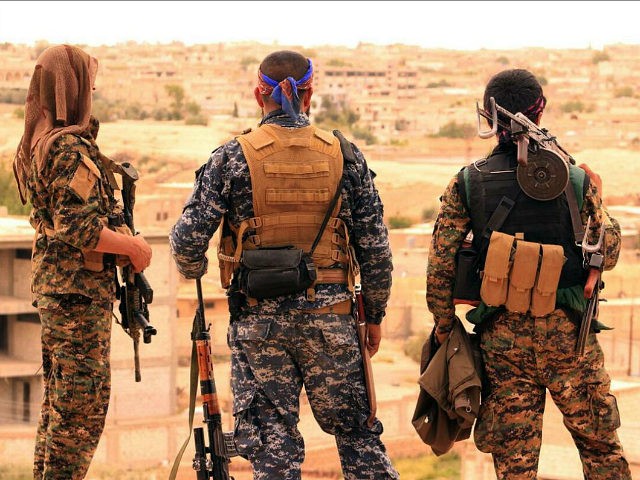The Syrian Democratic Forces (SDF), a multi-ethnic coalition of militias in the country, have reportedly made gains on either side of the city of Raqqa, slowly surrounding an estimated 4,000 jihadists preparing to fight for their “capital.”
The SDF – of which the majority are fighters from the Syrian Kurdish People’s Protection Units (YPG/YPJ) but also includes Turkmen, Arabs, and Assyrian Christians – announced on Friday it had advanced on both the eastern and western fronts of the outskirts of Raqqa, according to Reuters. The next day, Reuters reports that at least ten people were killed by a U.S. airstrike within Raqqa itself.
Rudaw, a Kurdish news outlet, reported Monday that the SDF’s major advances occurred in western Raqqa and cites a spokesman for the U.S.-led effort against the Islamic State as adding more detail shortly before the advances Reuters reported. “To the South is the Euphrates River and with bridges that cannot be used to cross, ISIS is limited to using water craft to move in to or out of Raqqah… Understanding this the coalition conducted several strikes this week, destroying 20 boats, attempting to shuttle ISIS fighters across the river,” Col. Ryan Dillon is quoted as saying.
The Kurdish outlet Kurdistan24 also reported this week that one of its reporters, along with two other journalists, was injured in Raqqa while attempting to cover the battle. “Kurdistan24 correspondent Redwan Bezar was injured when an unknown drone hovering in a neighborhood recently liberated by the Kurdish-led Syrian Democratic Forces (SDF) in east of Raqqa threw explosives near him,” the outlet reports.
Kurdistan24 does not specify who launched the attack, but cites an SDF spokesman who claimed that the militia had freed a “strategic military base” and sugar factory in the area.
Rudaw adds that the Islamic State is fighting back, however, claiming to have abducted a number of YPG fighters, though the YPG has not confirmed this report. The Islamic State “Amaq News Agency,” which reported the abduction, also accused the United States of dropping white phosphorus on the city. Rudaw cites the advocacy group Raqqa Is Being Slaughtered Silently as also making claims to seeing white phosphorus used in the city, publishing what it claims to be video proof of the gas being present there.
Al Jazeera spoke with a “Tabqa-based activist” who reported that civilians within the city were told they could leave the city “but without taking their belongings.”
He also suggested that civilians supported the Syrian Kurdish coalition over any of the other potential powers fighting for Raqqa. “If the Kurds take Raqqa, displaced people can go back to their homes. We are literally left with just three options: the Syrian government, ISIL or the Kurds. We choose the Kurds,” he is quoted as saying.
In March, Islamic State leaders began fleeing Raqqa in anticipation of the current battle, according to multiple reports.
The Trump administration announced in May that it would begin providing heavy munitions to the “Kurdish elements of the Syrian Democratic Forces as necessary to ensure a clear victory over ISIS in Raqqa.” In the statement, Pentagon spokesperson Dana White reiterated the commonly-held belief that the YPG “are the only force on the ground that can successfully seize Raqqa in the near future.”
The move angered the government of Turkey, which considers the YPG a terrorist organization under the same structure as the Kurdistan Workers’ Party (PKK).
The U.S. considers the two distinct groups and has designated the PKK a terrorist organization. Shortly after the Raqqa operation was announced, Prime Minister Binali Yıldırım threatened to attack YPG forces if they got too close to the Turkish border or were emboldened in any way that challenged Turkey.
In December, President Recep Tayyip Erdogan had demanded Turkey have a role in the liberation of Raqqa “because Turkey is a global power,” adding that Turkey had a vested interest in keeping Syria stable, as it has taken in millions of Syrian refugees.

COMMENTS
Please let us know if you're having issues with commenting.